Dien Bien is a mountainous province with more than 599,000 people, 19 ethnic groups living together (Mong, Thai, Kinh, Dao, Kho Mu, Ha Nhi, Lao, Hoa, Khang, Muong, Cong, Xi Mun, Si La; Nung, Phu La, Tay, ...). Of which, Mong people account for 38.12%; Thai people account for 35.69%; Kinh people account for 20%, the rest are other ethnic groups. Ethnic groups in the province all have their own languages. Among the 19 ethnic groups, Thai and Mong people are 02 ethnic minorities that are allowed
by the Ministry of Education and Training to teach writing at the primary level. In recent years, the development of ethnic education in Dien Bien province has made important progress. The scale of schools and classes has been expanded, basically meeting the learning needs of children of ethnic groups in the province. The rate of mobilizing the population in preschool and general education age groups to attend classes is increasing; the literacy rate in all age groups is increasing; the quality of education is gradually improving; education in especially disadvantaged areas and ethnic minority areas is receiving attention; the goals of education and training development and achieving universal education and illiteracy eradication standards are all achieved and exceeded compared to the set plan. [caption id="attachment_603648" align="alignnone" width="768"]
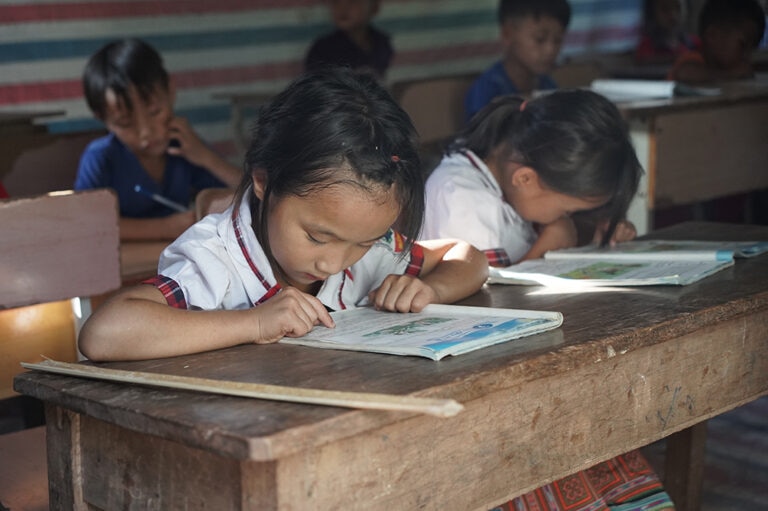
Dien Bien has issued many policies for comprehensive
education development, especially for ethnic minority students.[/caption]
Results of universal education and illiteracy eradication By the end of 2020,
Dien Bien province had 170 preschools for 5-year-old children, with 2,485 classes and nearly 59,000 children. 100% of teachers teaching 5-year-old classes had qualified training or higher. The rate of mobilizing 5-year-old children to attend class reached 99.93%; the rate of 5-year-old children assessed as completing the preschool education program reached 100%. 129/129 communes and 10/10 districts maintained the standards for universal preschool education for 5-year-old children. The province maintained the standards for universal preschool education for 5-year-old children. For universal primary education, the province has 148 schools, 2,886 classes and nearly 74,000 students. Nearly 60% of teachers meet or exceed the training standards prescribed by the 2019 Education Law. 99.6% of teachers meet professional standards. The rate of 6-year-old children attending grade 1 is 100%; the rate of 11-year-old children completing primary school is 98.15%. 100% of communes and districts maintain the standard of universal primary education level 2; 119/129 communes meet the standard of supplementary primary education level 3, reaching a rate of 92.2%; 7/10 districts meet the standard of universal primary education level 3, reaching a rate of 70%. The province maintains the standard of universal primary education level 2. The work of eliminating illiteracy has also achieved important achievements with the rate of subjects aged 15-60 recognized as meeting the standard of literacy level 1 being 96.1%; The rate of subjects aged 15-35 recognized as having achieved literacy level 1 was 98.81%; the rate of subjects aged 15-60 recognized as having achieved literacy level 2 was 84.73%; the rate of subjects aged 15-35 recognized as having achieved literacy level 2 was 96.41%. 100% of communes and districts achieved and maintained literacy level 2 standards. The province was recognized as having achieved literacy level 2 standards by the end of 2020.
Continuing efforts Looking back at the results achieved, besides the joy, there are still many difficulties and challenges in the process of ensuring and promoting the right to education and training of ethnic people in the province. [caption id="attachment_603656" align="alignnone" width="768"]
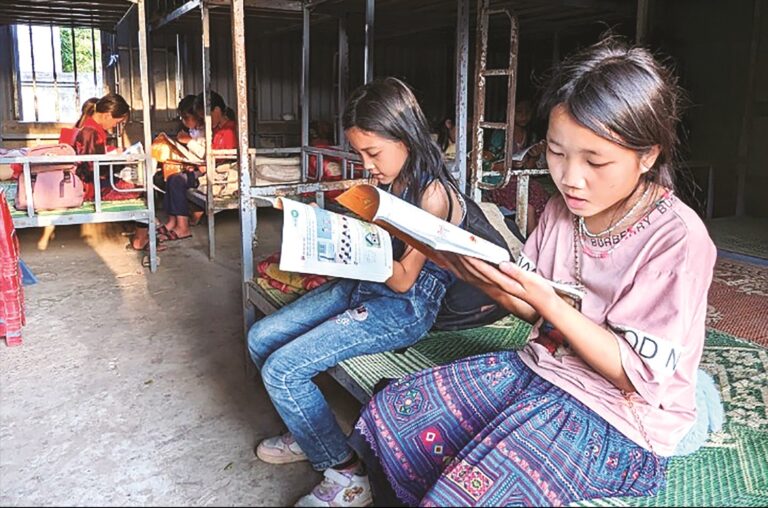
Overcoming difficulties and geographical barriers, Dien Bien has done well in educating students in mountainous areas and ethnic minorities.[/caption] Although Dien Bien province has met the criteria for universalizing lower secondary education at level 2 and the number of literate people aged 36-60 in some particularly difficult areas has met the set plan, the criteria for achieving the standards are still at a minimum level, lacking sustainability. The rate of students and trainees who do not attend school regularly at some times is still high. The quality of education in some mountainous schools has changed but slowly... The reasons for the above situation are due to the large area of the province, difficult transportation, scattered population, far from the commune center, far from schools, and uneven educational level. Some social phenomena such as early marriage, spontaneous migration, illegal border crossing to work abroad... have significantly affected the mobilization of children to go to school and maintaining student numbers. Mobilizing illiterate people to attend classes and maintaining the number of students is difficult because learners are the main labor force in the family, the number of learners in the villages is small and the distance between the villages is far; the study time depends on the season, weather and some customs of the people. A part of learners after eliminating illiteracy due to little use, become illiterate again. The above shortcomings and limitations require Dien Bien province to implement many synchronous solutions. First of all, in terms of communication, it is necessary to promote and diversify the forms of information and propaganda to raise awareness and responsibility of all levels, sectors, communities and each person about the purpose and significance of universal education - eliminating illiteracy and building a learning society, creating a solid foundation to contribute to improving people's knowledge, training human resources, identifying the task of universal education - eliminating illiteracy as the responsibility of the whole society, the right and obligation of each person. In addition, strengthen and improve the capacity, responsibility of leadership and direction of Party committees, authorities, and Steering Committees for universal education and illiteracy eradication at all levels in organizing the implementation of the task of developing education and training in general and the task of universal education and illiteracy eradication in particular. Promote the combined strength of the entire
political system in the process of implementing the goals of developing education and training and universal education and illiteracy eradication. The province has also included the content of universal education and illiteracy eradication in the work program of all levels, defining the responsibilities of all levels, sectors, and mass organizations for the development of education and training and the implementation of the task of universal education and illiteracy eradication. Departments, sectors, mass organizations, socio-political organizations, Party committees, and authorities at all levels have stepped up the work of mobilizing people for children of all ages to go to class, attend school regularly, and reduce dropouts in order to improve the quality and effectiveness of education; promote the work of encouraging learning, encouraging talents and building a learning society; Organize vocational training classes for rural workers, for students studying at the Center for Vocational Education and Continuing Education. Regarding the work of eliminating illiteracy, Dien Bien will continue to mobilize retired cadres, members, and members of mass organizations to participate in teaching illiteracy. Promote voluntary activities to teach illiteracy of the Youth Union and Women's Union; mobilize officers and soldiers of the Border Guard to participate in teaching illiteracy classes at the border; mobilize businesses, organizations, and philanthropists to contribute funds to support teachers and learners of illiteracy. With many solutions, the mountainous and ethnic province of Dien Bien is determined not to leave anyone behind in accessing educational and training opportunities - one of the evidences for ensuring universal human rights that has been recognized in the implementation of ensuring human rights and children's rights.
 Dien Bien has issued many policies for comprehensiveeducation development, especially for ethnic minority students.[/caption] Results of universal education and illiteracy eradication By the end of 2020, Dien Bien province had 170 preschools for 5-year-old children, with 2,485 classes and nearly 59,000 children. 100% of teachers teaching 5-year-old classes had qualified training or higher. The rate of mobilizing 5-year-old children to attend class reached 99.93%; the rate of 5-year-old children assessed as completing the preschool education program reached 100%. 129/129 communes and 10/10 districts maintained the standards for universal preschool education for 5-year-old children. The province maintained the standards for universal preschool education for 5-year-old children. For universal primary education, the province has 148 schools, 2,886 classes and nearly 74,000 students. Nearly 60% of teachers meet or exceed the training standards prescribed by the 2019 Education Law. 99.6% of teachers meet professional standards. The rate of 6-year-old children attending grade 1 is 100%; the rate of 11-year-old children completing primary school is 98.15%. 100% of communes and districts maintain the standard of universal primary education level 2; 119/129 communes meet the standard of supplementary primary education level 3, reaching a rate of 92.2%; 7/10 districts meet the standard of universal primary education level 3, reaching a rate of 70%. The province maintains the standard of universal primary education level 2. The work of eliminating illiteracy has also achieved important achievements with the rate of subjects aged 15-60 recognized as meeting the standard of literacy level 1 being 96.1%; The rate of subjects aged 15-35 recognized as having achieved literacy level 1 was 98.81%; the rate of subjects aged 15-60 recognized as having achieved literacy level 2 was 84.73%; the rate of subjects aged 15-35 recognized as having achieved literacy level 2 was 96.41%. 100% of communes and districts achieved and maintained literacy level 2 standards. The province was recognized as having achieved literacy level 2 standards by the end of 2020. Continuing efforts Looking back at the results achieved, besides the joy, there are still many difficulties and challenges in the process of ensuring and promoting the right to education and training of ethnic people in the province. [caption id="attachment_603656" align="alignnone" width="768"]
Dien Bien has issued many policies for comprehensiveeducation development, especially for ethnic minority students.[/caption] Results of universal education and illiteracy eradication By the end of 2020, Dien Bien province had 170 preschools for 5-year-old children, with 2,485 classes and nearly 59,000 children. 100% of teachers teaching 5-year-old classes had qualified training or higher. The rate of mobilizing 5-year-old children to attend class reached 99.93%; the rate of 5-year-old children assessed as completing the preschool education program reached 100%. 129/129 communes and 10/10 districts maintained the standards for universal preschool education for 5-year-old children. The province maintained the standards for universal preschool education for 5-year-old children. For universal primary education, the province has 148 schools, 2,886 classes and nearly 74,000 students. Nearly 60% of teachers meet or exceed the training standards prescribed by the 2019 Education Law. 99.6% of teachers meet professional standards. The rate of 6-year-old children attending grade 1 is 100%; the rate of 11-year-old children completing primary school is 98.15%. 100% of communes and districts maintain the standard of universal primary education level 2; 119/129 communes meet the standard of supplementary primary education level 3, reaching a rate of 92.2%; 7/10 districts meet the standard of universal primary education level 3, reaching a rate of 70%. The province maintains the standard of universal primary education level 2. The work of eliminating illiteracy has also achieved important achievements with the rate of subjects aged 15-60 recognized as meeting the standard of literacy level 1 being 96.1%; The rate of subjects aged 15-35 recognized as having achieved literacy level 1 was 98.81%; the rate of subjects aged 15-60 recognized as having achieved literacy level 2 was 84.73%; the rate of subjects aged 15-35 recognized as having achieved literacy level 2 was 96.41%. 100% of communes and districts achieved and maintained literacy level 2 standards. The province was recognized as having achieved literacy level 2 standards by the end of 2020. Continuing efforts Looking back at the results achieved, besides the joy, there are still many difficulties and challenges in the process of ensuring and promoting the right to education and training of ethnic people in the province. [caption id="attachment_603656" align="alignnone" width="768"]  Overcoming difficulties and geographical barriers, Dien Bien has done well in educating students in mountainous areas and ethnic minorities.[/caption] Although Dien Bien province has met the criteria for universalizing lower secondary education at level 2 and the number of literate people aged 36-60 in some particularly difficult areas has met the set plan, the criteria for achieving the standards are still at a minimum level, lacking sustainability. The rate of students and trainees who do not attend school regularly at some times is still high. The quality of education in some mountainous schools has changed but slowly... The reasons for the above situation are due to the large area of the province, difficult transportation, scattered population, far from the commune center, far from schools, and uneven educational level. Some social phenomena such as early marriage, spontaneous migration, illegal border crossing to work abroad... have significantly affected the mobilization of children to go to school and maintaining student numbers. Mobilizing illiterate people to attend classes and maintaining the number of students is difficult because learners are the main labor force in the family, the number of learners in the villages is small and the distance between the villages is far; the study time depends on the season, weather and some customs of the people. A part of learners after eliminating illiteracy due to little use, become illiterate again. The above shortcomings and limitations require Dien Bien province to implement many synchronous solutions. First of all, in terms of communication, it is necessary to promote and diversify the forms of information and propaganda to raise awareness and responsibility of all levels, sectors, communities and each person about the purpose and significance of universal education - eliminating illiteracy and building a learning society, creating a solid foundation to contribute to improving people's knowledge, training human resources, identifying the task of universal education - eliminating illiteracy as the responsibility of the whole society, the right and obligation of each person. In addition, strengthen and improve the capacity, responsibility of leadership and direction of Party committees, authorities, and Steering Committees for universal education and illiteracy eradication at all levels in organizing the implementation of the task of developing education and training in general and the task of universal education and illiteracy eradication in particular. Promote the combined strength of the entire political system in the process of implementing the goals of developing education and training and universal education and illiteracy eradication. The province has also included the content of universal education and illiteracy eradication in the work program of all levels, defining the responsibilities of all levels, sectors, and mass organizations for the development of education and training and the implementation of the task of universal education and illiteracy eradication. Departments, sectors, mass organizations, socio-political organizations, Party committees, and authorities at all levels have stepped up the work of mobilizing people for children of all ages to go to class, attend school regularly, and reduce dropouts in order to improve the quality and effectiveness of education; promote the work of encouraging learning, encouraging talents and building a learning society; Organize vocational training classes for rural workers, for students studying at the Center for Vocational Education and Continuing Education. Regarding the work of eliminating illiteracy, Dien Bien will continue to mobilize retired cadres, members, and members of mass organizations to participate in teaching illiteracy. Promote voluntary activities to teach illiteracy of the Youth Union and Women's Union; mobilize officers and soldiers of the Border Guard to participate in teaching illiteracy classes at the border; mobilize businesses, organizations, and philanthropists to contribute funds to support teachers and learners of illiteracy. With many solutions, the mountainous and ethnic province of Dien Bien is determined not to leave anyone behind in accessing educational and training opportunities - one of the evidences for ensuring universal human rights that has been recognized in the implementation of ensuring human rights and children's rights.
Overcoming difficulties and geographical barriers, Dien Bien has done well in educating students in mountainous areas and ethnic minorities.[/caption] Although Dien Bien province has met the criteria for universalizing lower secondary education at level 2 and the number of literate people aged 36-60 in some particularly difficult areas has met the set plan, the criteria for achieving the standards are still at a minimum level, lacking sustainability. The rate of students and trainees who do not attend school regularly at some times is still high. The quality of education in some mountainous schools has changed but slowly... The reasons for the above situation are due to the large area of the province, difficult transportation, scattered population, far from the commune center, far from schools, and uneven educational level. Some social phenomena such as early marriage, spontaneous migration, illegal border crossing to work abroad... have significantly affected the mobilization of children to go to school and maintaining student numbers. Mobilizing illiterate people to attend classes and maintaining the number of students is difficult because learners are the main labor force in the family, the number of learners in the villages is small and the distance between the villages is far; the study time depends on the season, weather and some customs of the people. A part of learners after eliminating illiteracy due to little use, become illiterate again. The above shortcomings and limitations require Dien Bien province to implement many synchronous solutions. First of all, in terms of communication, it is necessary to promote and diversify the forms of information and propaganda to raise awareness and responsibility of all levels, sectors, communities and each person about the purpose and significance of universal education - eliminating illiteracy and building a learning society, creating a solid foundation to contribute to improving people's knowledge, training human resources, identifying the task of universal education - eliminating illiteracy as the responsibility of the whole society, the right and obligation of each person. In addition, strengthen and improve the capacity, responsibility of leadership and direction of Party committees, authorities, and Steering Committees for universal education and illiteracy eradication at all levels in organizing the implementation of the task of developing education and training in general and the task of universal education and illiteracy eradication in particular. Promote the combined strength of the entire political system in the process of implementing the goals of developing education and training and universal education and illiteracy eradication. The province has also included the content of universal education and illiteracy eradication in the work program of all levels, defining the responsibilities of all levels, sectors, and mass organizations for the development of education and training and the implementation of the task of universal education and illiteracy eradication. Departments, sectors, mass organizations, socio-political organizations, Party committees, and authorities at all levels have stepped up the work of mobilizing people for children of all ages to go to class, attend school regularly, and reduce dropouts in order to improve the quality and effectiveness of education; promote the work of encouraging learning, encouraging talents and building a learning society; Organize vocational training classes for rural workers, for students studying at the Center for Vocational Education and Continuing Education. Regarding the work of eliminating illiteracy, Dien Bien will continue to mobilize retired cadres, members, and members of mass organizations to participate in teaching illiteracy. Promote voluntary activities to teach illiteracy of the Youth Union and Women's Union; mobilize officers and soldiers of the Border Guard to participate in teaching illiteracy classes at the border; mobilize businesses, organizations, and philanthropists to contribute funds to support teachers and learners of illiteracy. With many solutions, the mountainous and ethnic province of Dien Bien is determined not to leave anyone behind in accessing educational and training opportunities - one of the evidences for ensuring universal human rights that has been recognized in the implementation of ensuring human rights and children's rights.







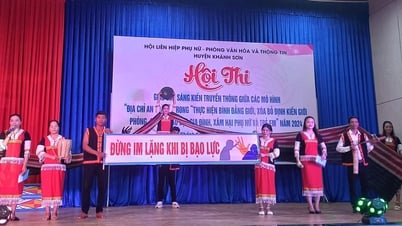



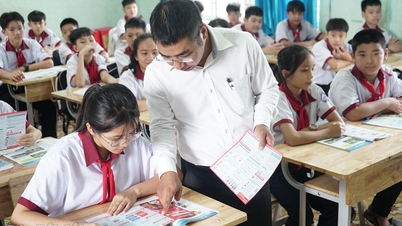









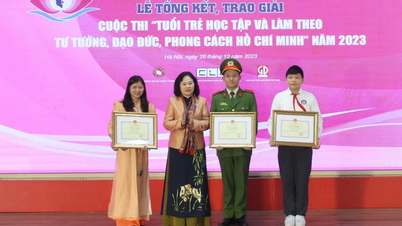


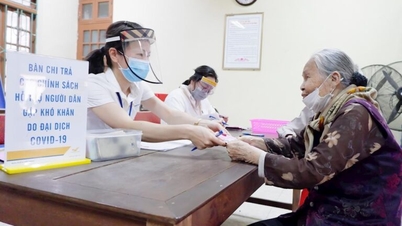















































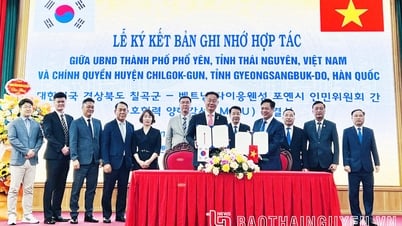

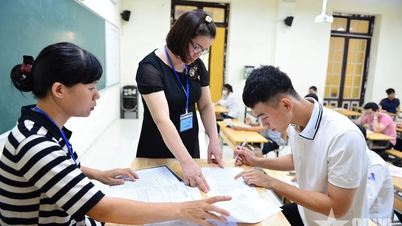

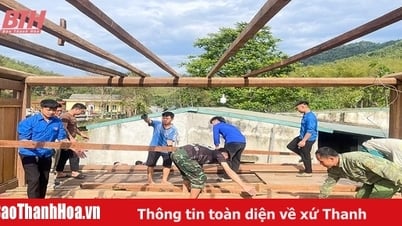













![[OCOP REVIEW] Tu Duyen Syrup - The essence of herbs from the mountains and forests of Nhu Thanh](https://vphoto.vietnam.vn/thumb/402x226/vietnam/resource/IMAGE/2025/6/5/58ca32fce4ec44039e444fbfae7e75ec)



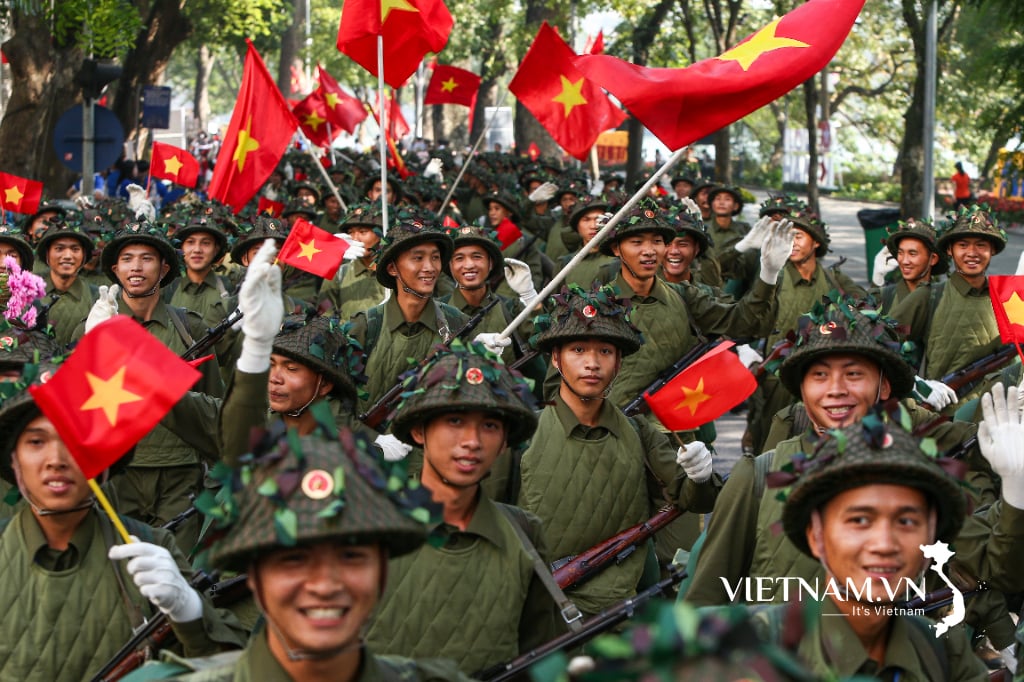


Comment (0)